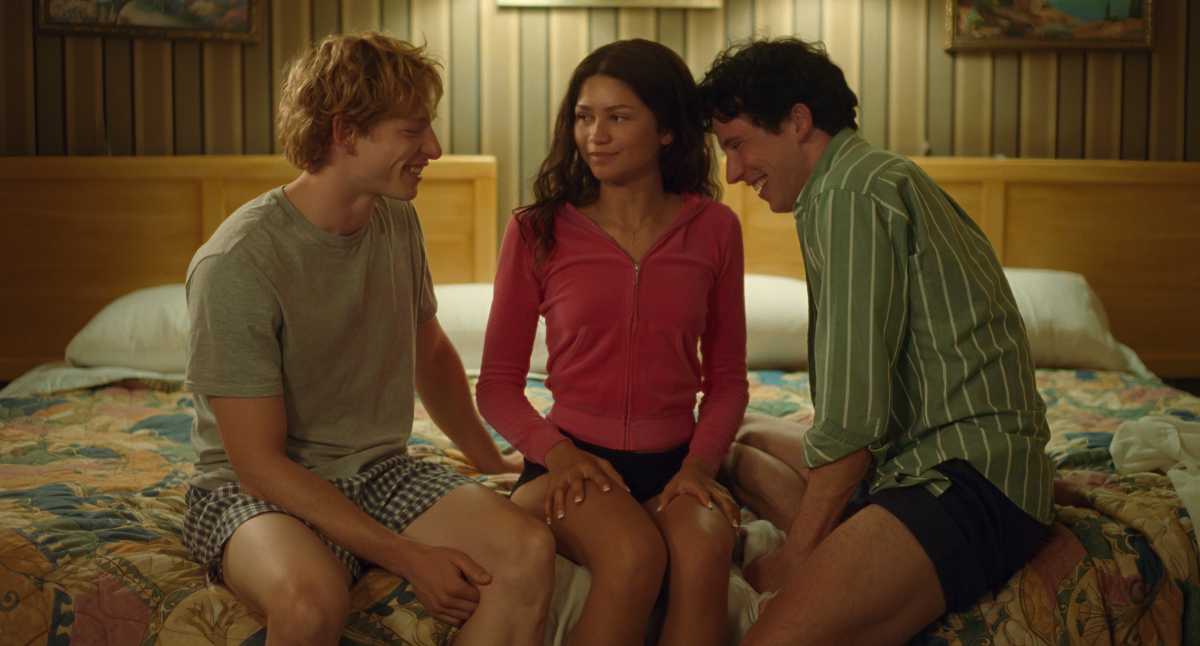“Challengers,” directed by gay filmmaker Luca Guadagnino, is the tale of two tennis pros who’ve known each other since they were 12. Professional tennis players Art (Mike Faist) and Patrick (Josh O’Connor) are in love. They know it, and they’re even capable of expressing their desire without too much self-consciousness. But their potential is wrecked by competition and their inability to act out queerness without the meditation of a woman. Tashi (Zendaya) began as one of their peers, playing tennis at the college they all attended. After a broken knee destroyed her ability to participate in the sport, she became a coach and married Art. His career has gone very well, while Patrick is barely making a living. The film follows their lives over the period from 2006 to 2019, looping back and forth in time.
Not even the dimmest spectator could miss the queer subtext of “Challengers.” For a film about two men who go no further than making out with each other, it’s glaring. Art and Patrick munch on bananas while looking into each other’s eyes. They share a hotel room together. Art even admits that he taught Patrick how to masturbate when they were 12. There’s no explicit homophobia in the film, and repression doesn’t seem to be motivating their reluctance to fall in love or have sex with each other. Even so, they fall into the pattern queer theorist Eve Kososfky Sedgwick described in 19th-century literature, where homosocial desire passes through a woman to avoid being fully expressed. We’ve progressed far enough that Art and Patrick don’t engage in “no homo” joking. Still, their lives are harmed by the fact that they’re only willing to kiss each other in Tashi’s presence. The final scene suggests the persistence of queerness and, even, a possible brighter future. It’s suspenseful yet funny.
O’Connor excels in the challenging dual role of a teenager and his older self. The tennis circuit has not been kind to him. “Challengers” presents sports as a world emptied of glamour or real financial rewards. New Rochelle and Cincinnati are the two cities it mentions most often. Eating fast food while sleeping in cheap hotels is a grind of a life. At 31, Patrick looks closer to 40, sporting a scruffy beard and wrinkled forehead. (In real life, he’s even older than his character.) He’s become burnt out to a much degree than his rival, even looking physically ill during his last tennis match.
For a film about the disenchantment that comes with age, “Challengers” is light on its feet. Never all that explicit (it avoids full frontal nudity in a sauna scene), “Challengers” pulls off a steady rhythm of sexual tension. Guadagnino’s style takes a sensual approach to the material. Art and Patrick reveal their shirtless torsos with the slightest prompting. They look fashionable without ever coming across like they just walked to the tennis court from a runway. Trent Reznor and Atticus Ross’ electronic dance music soundtrack contributes to the energy level, especially when played over tennis matches. The sound of balls striking the racket could have been sampled into the drum tracks. The court is a space of physical struggle, where winning the game comes second to exerting control over another person. Guadagnino’s visceral editing brings out the sexual elements of this play.
It would’ve been easy to turn Tashi into an obligation more than a character, keeping her presence in the story to a minimum. Instead, her motivation, rooted in her experience during college, sets the final third’s events going. Pushed away from direct participation in tennis, she still sets the tone for action on the court. Art and Patrick’s attraction towards each other is matched by both men’s genuine desire for her. Taking “Call Me By Your Name” further, Guadagnino depicts a sexuality that can’t be pinned down easily to a single orientation.
Honestly, some of the queer elements of “Challengers” are a little smirky and self-satisfied. Repeating images of Art and Patrick eating phallic food loses its potency after the churros and hot dogs. But the film finds a proper tone by its second half. Its material can be unpleasant, yet it keeps a light tone. It keeps faith in its characters, who are extremely flawed people but never treated as villains.
“Challengers” | Directed by Luca Guadagnino | Amazon MGM | Opens April 26th



































